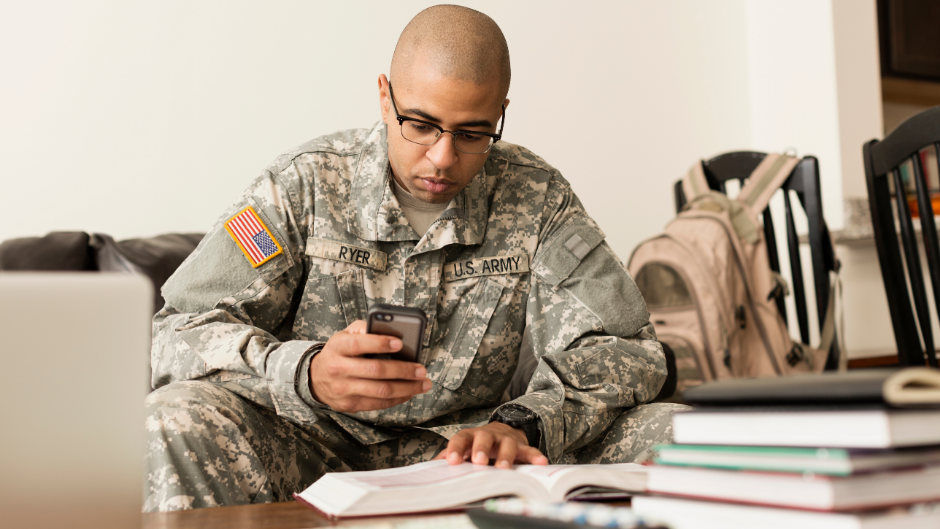The military experience and the virtual classroom experience at the University of Miami UOnline have a few things in common: They're both nontraditional life paths that require drive and dedication. With the combination of robust government benefits and the flexibility of modern distance learning, more active service members and veterans are trading in their helmets for a cap and gown.
Helping Hands
The Post-9/11 G.I. Bill helped more than a million veterans and their families attend college between 2008 and 2014 reports the U.S. Department of Veterans Affairs. For many, this financial aid program is the key to the postsecondary classroom — not only does it pay for in-state or distance learning tuition, but it provides financial stipends for textbooks and educational supplies and even housing.
Online students who take advantage of the G.I. Bill can focus less on financial burdens and more on the things that matter by choosing where they want to live. The benefits foot the bill for 50 percent of a student's housing costs based on national averages. If you decide to take the option, it'll be there for you — benefits don't expire until 15 years after release from service.
Serve and Learn
Earning a graduate online degree often takes longer for military members and veterans than for others simply because of the nature of service — those who serve are juggling deployment, family responsibilities and sometimes even civilian jobs. Your schedule must be adaptable when studying nights, weekends or in between 12-hour combat schedules and patrols.
This is where the flexibility of distance learning transcends convenience and becomes essential. U.S. Army veteran Isaiah Ruffin, who's pursuing an online master's degree, speaks from experience: “Online programs have provided great flexibility in my pursuit of higher education while on active duty, transitioning out ofservice, and even so afterwards, traveling the world.”
Whether you choose to pursue an online business administration program, nursing informatics online programs, an accredited master's in sports administration or others, UOnline's e-learning experience offers access to the same industry-leading faculty and 180,000-plus global alumni network as its on-campus programs — but it does it on your terms. You choose your start time, set your class schedule and can learn wherever and whenever you like via smartphone, tablet, laptop or desktop. In some ways, the online classroom and basic training aren't all that different — both emphasize engagement, collaboration and a focus on outcomes.
The Next Phase
Just as the G.I. Bill and other programs encourage vets and those on active duty to take the higher education journey, plenty of nonprofit programs exist to help those who have served. Look to these
groups to help you get oriented in school when you're ready to enter the post-military phase of your life and career.
Student Veterans of America strives to support the journey from soldier to student to leader by offering grants and leadership workshops to veterans pursuing any level of postsecondary education. The same University of Miami partners that serve on-campus graduates can help you take your first steps into a civilian career after you have your UOnline degree. You gave your all for your country, and now organizations like America's Heroes at Work, Hero2Hired, Troops to Teachers and many more want to give back to you.
The persistence and dedication that defines many student veterans also enables them to excel in the academic environment, whether it's virtual or physical. According to the U.S. Department of Veterans Affairs, over 31 percent of student vets who complete any sort of postsecondary certificate go on to even higher levels of education: over 35 percent of two-year degree grads continue to the baccalaureate level and an impressive 20 percent of bachelor's degree holders trek toward a master's degree.
You might find that your military-bred drive to succeed pays off long after you're been released from active duty. As Ruffin reminds us, “My military experience gave me a diverse skill set that is readily applicable to most walks of life,” including the pursuit of higher education, whether online or in-person.
References
- U.S. Department of Veterans Affairs: Veterans in Higher Education: America's Smart Investment
- National Conference of State Legislatures: State and Community Roles in Supporting College Completion for Veterans
- U.S. Department of Veterans Affairs: Independent and Distance Learning Training
- The New York Times: The Complicated World of Higher Education for Troops and Veterans
- University of Miami: Veterans at UM
- National Education Association: Ten Things You Should Know About Today's Student Veteran

